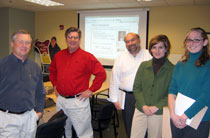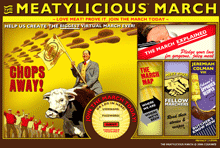Morgan&Myers named agency of record for Bou-Matic.
Early registration for the IPM Symposium still open.
Leo Melamed Selected to Receive the 2005 CME Fred Arditti Award.
Get a farmers market promotion grant from USDA.
Morgan&Myers named agency of record for Bou-Matic.
Early registration for the IPM Symposium still open.
Leo Melamed Selected to Receive the 2005 CME Fred Arditti Award.
Get a farmers market promotion grant from USDA.
 We’ve got some pretty good website statistics software but I’ve been wanting to compare it with some others. I am tired of waiting to be invited to Google Analytics and thanks to a heads up from our web developer I’m giving Performancing Metrics, a new blog statistics service, a try. I just got tired of being invited to Google Analytics.
We’ve got some pretty good website statistics software but I’ve been wanting to compare it with some others. I am tired of waiting to be invited to Google Analytics and thanks to a heads up from our web developer I’m giving Performancing Metrics, a new blog statistics service, a try. I just got tired of being invited to Google Analytics.
I’ve set up all the ZimmComm blogs to be analyzed. I’ll be able to check my site’s metrics from anywhere and make the results public if I want. I can do this now but I think it’s always good to double check things. Kind of like getting a second opinion for a medical condition.
 This post is being written during a live presentation with McCormick in Kansas City at their office. We’ve been talking about blogging, podcasting and news release distribution.
This post is being written during a live presentation with McCormick in Kansas City at their office. We’ve been talking about blogging, podcasting and news release distribution.
Although I’m starting to lose people I’m going to post a picture of who’s left (if they’ll let me).
Update: Picture
Get Your Farmers Market Resource Guide. (pdf file)
Biomaxx Systems is now a member of Bioenergy Australia.
Find out information about BSE here, here, here and here.
Tiger Beer coming to America via Anheuser-Busch.
 If I hadn’t been having so much sinus trouble this winter I would have passed this by but somehow the idea of hot peppers and a sinus spray just grabbed my attention. I would be seriously afraid to try Sinusbuster. Sometimes you wonder what’s worse, the cure or the disease.
If I hadn’t been having so much sinus trouble this winter I would have passed this by but somehow the idea of hot peppers and a sinus spray just grabbed my attention. I would be seriously afraid to try Sinusbuster. Sometimes you wonder what’s worse, the cure or the disease.
When “Sinus Buster” hot pepper nasal spray was first introduced to Canadian consumers in mid 2005, it became an instant hit. Within 6 months, Sinus Buster went from retail obscurity to being featured on the shelves of more than 300 stores throughout Canada. SiCap Industries, the company that manufactures Sinus Buster claims their unique product is well on its way to becoming the number one sinus & headache product in Canada.
Here’s the part that I thought was most interesting though.
SiCap also credits a combination of major media exposure and radio commercials running on Sirius Satellite for the incredible growth of Sinus Buster throughout North America. “We got featured in “First” magazine for women, and then we started running the Sirius radio spots. We got immediate results here in the states, but as soon as Canada began allowing airplay of the Stern 100 channel on Sirius, we saw a huge spike in Canadian sales. There’s no doubt Canadians are listening to Howard Stern and Sirius in large numbers. Our Canadian distributor gets calls everyday from new retailers who heard about Sinus Buster on Sirius,” Perry adds.
You can watch their first tv commercial here.
 After just finishing a Quiznos salad that must have contained about a pound of roast beef and bacon I was very happy to see the Colman’s Mustard, Meatylicious March website, (thank you Chroma, via AdJab).
After just finishing a Quiznos salad that must have contained about a pound of roast beef and bacon I was very happy to see the Colman’s Mustard, Meatylicious March website, (thank you Chroma, via AdJab).
Visitors can register for the march or they can look at places already visited on the march like, Guild of Q Butchers or Hats of Meat. This is virtual marketing at its finest in my opinion.
You can find things you need to know like the “Meatyfesto” which contains profound sayings like, “Four legs good. Two legs chicken (also good).” You’ll have to visit to enjoy it all for yourself
 This is your final reminder to get your entry in for the New Holland “Down on the Farm” Classic iPod Keepsake Contest. It’s easy and the odds are better than the lottery. We’ve had a lot of entries so far but you’ve still got until the end of the day March 15. Don’t wait.
This is your final reminder to get your entry in for the New Holland “Down on the Farm” Classic iPod Keepsake Contest. It’s easy and the odds are better than the lottery. We’ve had a lot of entries so far but you’ve still got until the end of the day March 15. Don’t wait.
We have the iPod and it’s loaded and ready to find a new owner. On it the winner will get the video of Michael Peterson’s performance at Commodity Classic, his new CD, all the pictures I took at Classic and the interviews and speeches I recorded. It comes out of the box ready to entertain and inform!
Go ahead, enter. Do it. You might be glad you did.
 ZimmComm New Media is 2 years old! Praise the Lord. Hard to believe. This week’s ZimmCast is a Chuck & Cindy summary of where the company is and where it’s going. We review why we changed our name to include “New Media” and talk about some of our blogging and podcasting projects.
ZimmComm New Media is 2 years old! Praise the Lord. Hard to believe. This week’s ZimmCast is a Chuck & Cindy summary of where the company is and where it’s going. We review why we changed our name to include “New Media” and talk about some of our blogging and podcasting projects.
Before you listen you need to know that I decided to test out a conference type microphone. It works great but really isn’t meant for what I used it for this week. So you’ll hear CJ the office dog a couple of times try to get into the act.
You can listen to this week’s ZimmCast here:  (16 min MP3)
(16 min MP3)
The ZimmCast is the official weekly podcast of AgWired which you can subscribe to using the link in our sidebar.
You can also now find the ZimmCast on CoolCast Radio or subscribe in iTunes.
 In my opinion is we need to lay this puppy to rest. Having Canadian corn users fighting with grain corn producers makes no sense at all, especially when it doesn’t really matter to the Americans. Lawyers representing the Animal Industry Corn Users suggest, if the Canada Border Services Agency follows its own guidelines, duties on U.S. corn entering Canada will be reduced substantially when it announces final subsidy and dumping determinations March 15.
In my opinion is we need to lay this puppy to rest. Having Canadian corn users fighting with grain corn producers makes no sense at all, especially when it doesn’t really matter to the Americans. Lawyers representing the Animal Industry Corn Users suggest, if the Canada Border Services Agency follows its own guidelines, duties on U.S. corn entering Canada will be reduced substantially when it announces final subsidy and dumping determinations March 15.
Investigations into complaints from Canadian corn growers alleging harm from subsidized US grain corn dumped into Canada, the CBSA imposed provisional antidumping and countervailing duties totalling $1.65 U.S. per bushel imported unprocessed U.S. grain corn. Lawyer Peter Clark suggests inflated figures were used to set those duties. “They added in margins of things like 40 and 50 cents a bushel at the elevator when all of the economic literature says its 10 or 11 cents,” said Clark. “They indicated the corn had to be delivered, at the elevator’s cost, from the farmers’ fields on average a hundred miles when we know that in the U.S., an elevator will tend to draw, on average within a 20 mile radius of the elevator and in fact most of it is within eight to 14 miles.”
Clark suggests the more accurate numbers would justify eliminating the antidumping duty and significantly reducing the countervailing duty. Meanwhile the Canadian International Trade Tribunal is expected to issue its final injury determination in mid-April. At that time, if it finds the U.S. imports are hurting Canadian growers, the new duties will take effect but, if the CITT finds no injury, the case ends and duties already collected will be refunded.
I hate it when blight attacks my anthuriums.
Another inconclusive bse test at USDA. I know we want to know but how ’bout when it’s conclusive?
USDA announced 6 biobased items that will now receive special consideration for procurement.
Griffin Bungener has been promoted to account executive at Bader Rutter & Associates in the agency’s account services group.
Crop insurance deadline is coming up March 15.
There’s a new group of officers at NPPC.